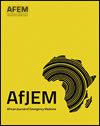在南非茨瓦内选定的公立医院急诊科工作的新护士的感知支持需求
IF 1.2
4区 医学
Q3 EMERGENCY MEDICINE
引用次数: 0
摘要
摘要急诊科的患者有不同的医疗需求,这就要求护士具备不同的临床能力才能有效地发挥作用。急诊部门的新手护士可能没有足够的能力来处理责任和工作量,因此需要足够的支持才能顺利过渡。然而,提供实际支持需要对支持需求有全面的了解。方法采用描述性质的研究方法,对急诊新护士的支持需求知觉进行调查。有目的地从南非茨瓦内的三家选定的公立医院中选出15名参与者。半结构化的面对面访谈于2023年9月至11月进行。对访谈进行录音,并通过ATLASti Version 24对笔录进行主题分析。结果支持急诊科新护士过渡的三个关键主题:专门的培训计划,专门的导师和支持性文化,以促进向急诊科的过渡。专门的培训方案包括基本组成部分,包括应急设备、分类、基本生命支持技能、入院和治疗规程以及具体能力。与会者强调了专门的导师、训练有素和经验丰富的专业人士的价值,他们提供指导、反馈和补救支持。此外,还强调了支持性文化的重要性,特别是培养积极学习环境和提供情感支持以缓解过渡过程的文化。结论急诊新护士的成功转型是提高工作满意度和留任率的有效途径。然而,在急诊科工作的新手护士有不同的支持需求。因此,确保成功过渡需要了解这些护士的支持需求。这项研究表明,建立一个结构化的培训计划,分配训练有素的辅导员和培育支持性文化是促进新手护士成功过渡到急诊科的关键。这些策略可以通过提高能力和病人护理结果、促进信心、情绪健康、工作满意度和保留来解决新手护士的支持需求。认识到新手护士的支持需求,可以为在特定急诊科环境中提供支持的循证过渡干预措施的发展提供信息。本文章由计算机程序翻译,如有差异,请以英文原文为准。
Perceived support needs of novice nurses working in emergency departments of selected public hospitals in Tshwane, South Africa
Introduction
Patients present with diverse healthcare needs in emergency departments, necessitating nurses to have diverse clinical competencies to function effectively. Novice nurses in emergency departments may be ill-equipped to handle responsibilities and workload, necessitating adequate support for a smooth transition. However, providing practical support requires a comprehensive understanding of support needs.
Methods
This descriptive qualitative study investigated the perceived support needs of novice nurses working in emergency departments. Fifteen participants were purposively selected from three selected public hospitals in Tshwane, South Africa. Semi structured, face-to-face interviews were conducted between September and November 2023. The interviews were audio-recorded, and the transcripts were thematically analysed via ATLASti Version 24.
Results
Three key themes emerged to support the transition of novice nurses in emergency departments: a dedicated orientation programme, a dedicated preceptor, and a supportive culture to facilitate the transition to emergency departments. A dedicated orientation programme encompasses essential components, including emergency equipment, triage, basic life support skills, admission and treatment protocols, and specific competencies. The participants emphasised the value of dedicated preceptors, trained and experienced professionals who offer guidance, feedback and remedial support. Additionally, the importance of a supportive culture, particularly one that fosters a positive learning environment and provides emotional support to ease the transition process, was highlighted.
Conclusion
The successful transition of novice nurses in emergency departments is a cost-effective way of improving job satisfaction and retention. However, novice nurses working in emergency departments have diverse support needs. Thus, ensuring a successful transition requires understanding these nurses’ support needs. This study revealed that establishing a structured orientation programme, assigning trained preceptors and fostering a supportive culture are critical in facilitating the successful transition of novice nurses to emergency departments. These strategies can address novice nurses’ support needs by improving competence and patient care outcomes and promoting confidence, emotional well-being, job satisfaction and retention. Realising the support needs of novice nurses may inform the development of evidence-based transition interventions that offer support in specific ED contexts.
求助全文
通过发布文献求助,成功后即可免费获取论文全文。
去求助
来源期刊

African Journal of Emergency Medicine
EMERGENCY MEDICINE-
CiteScore
2.40
自引率
7.70%
发文量
78
审稿时长
85 days
 求助内容:
求助内容: 应助结果提醒方式:
应助结果提醒方式:


